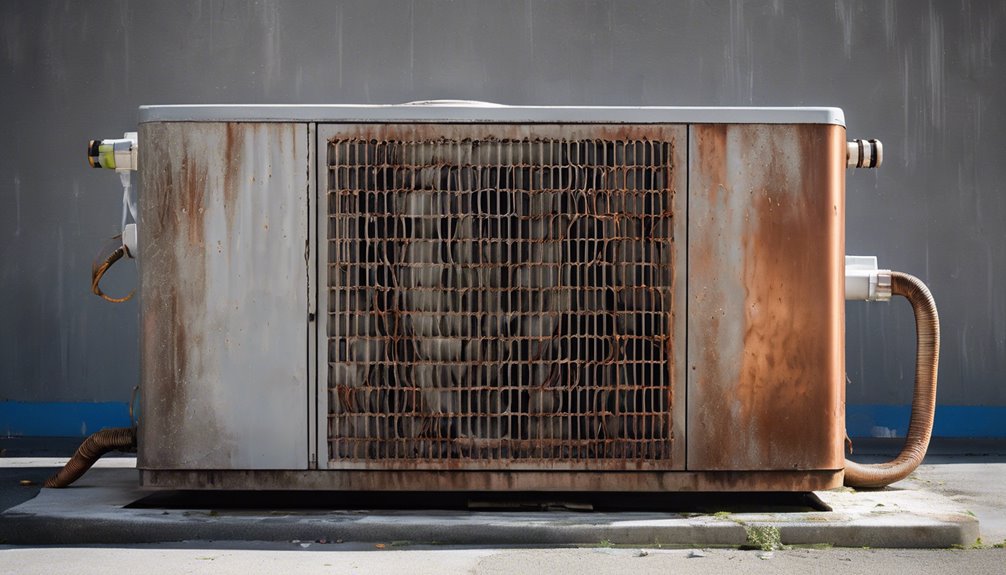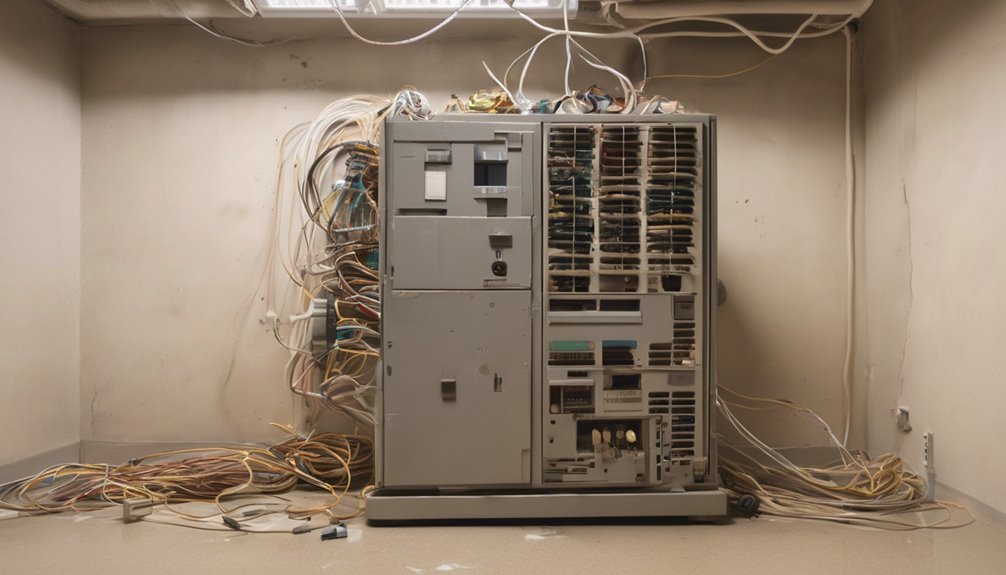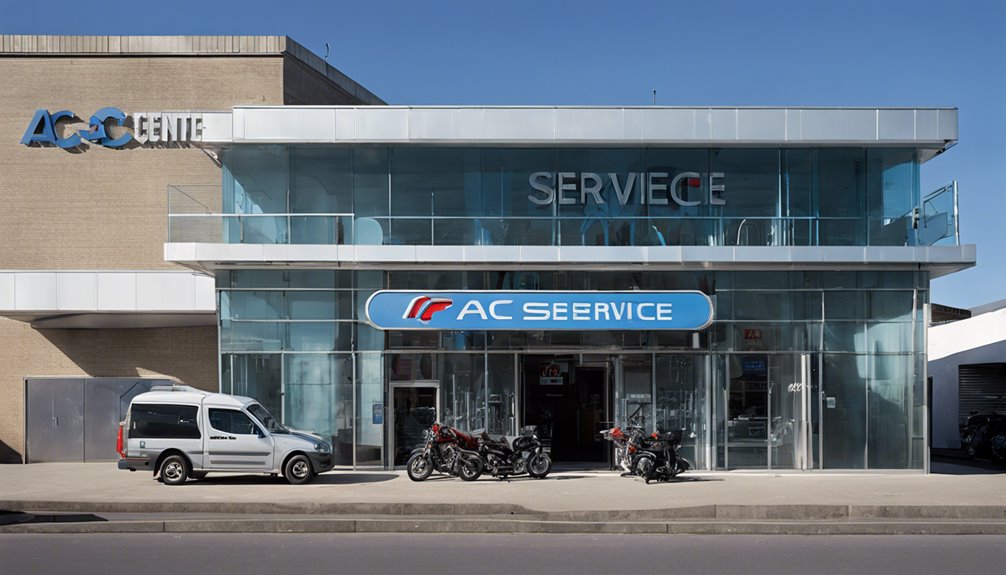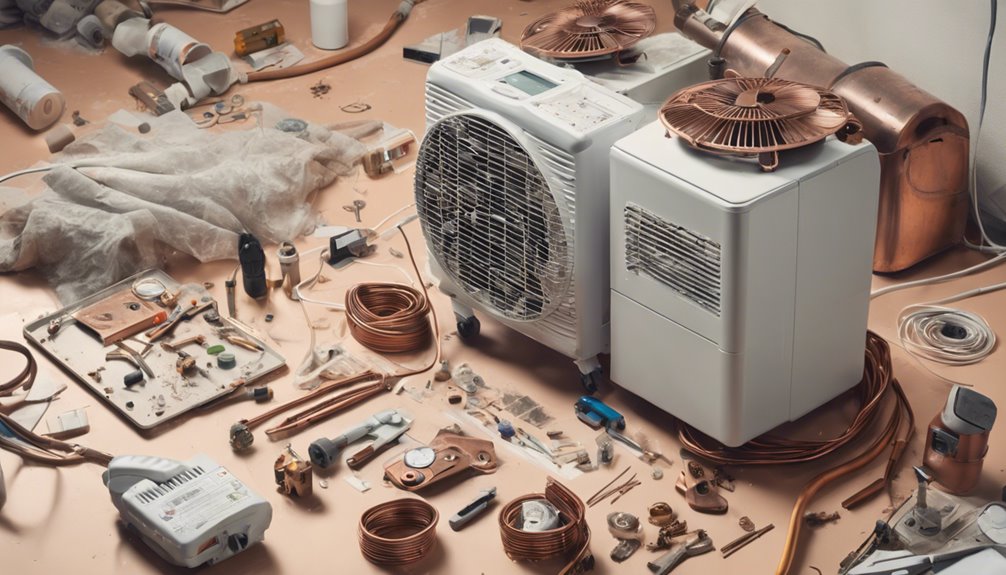If your AC compressor fails, you'll likely notice a sudden spike in your energy bills, reduced airflow from your vents, and strange noises coming from the compressor unit. These symptoms can lead to further damage, costly repairs, and even complete system failure if left unattended. Ignoring the issue can have serious consequences, but understanding the causes and consequences of compressor failure can help you make informed decisions about repair or replacement – and discover how to prevent future failures.
Key Takeaways
- A failed AC compressor can cause a sudden increase in energy bills and reduced airflow from vents.
- Ignoring a failed compressor can lead to system overload, costly repairs, and complete system failure.
- Failure to address a compressor issue can result in uncomfortable temperatures and unpleasant odors in your home.
- A failed compressor can cause the AC unit to shut down, leaving you without cool air during hot weather.
- Neglecting regular maintenance and tune-ups can lead to compressor failure, but proactive planning can minimize downtime and repair costs.
Compressor Failure Symptoms
When your AC compressor fails, it often exhibits telltale signs that something is amiss.
You might notice a sudden increase in your energy bills, or the air coming from your vents isn't as cool as it should be. Additionally, you might hear strange noises, like rattling or clunking, coming from the compressor unit.
If you're proactive, you can identify these symptoms early on and schedule a compressor diagnosis to pinpoint the issue. Regular compressor maintenance can also help prevent failures in the first place.
Causes of Compressor Failure
Identifying the causes of compressor failure is key to preventing future breakdowns.
You'll want to inspect your compressor's maintenance history, as neglecting regular tune-ups can lead to premature failure. Failing to replace air filters, clean condenser coils, and inspect refrigerant levels can cause your compressor to overwork and eventually fail.
Additionally, electrical surges can damage the compressor's internal components, leading to a breakdown. If you've experienced a power outage or electrical issue, it's essential to have your compressor checked before restarting it.
The Consequences of Ignoring a Failed Compressor
Ignoring a failed compressor can lead to a cascade of problems that'll leave you sweating and stressed.
If you continue to run your AC with a faulty compressor, you'll put excessive strain on the entire system, causing a system overload. This can lead to further damage to other components, resulting in costly repairs or even complete system failure.
Moreover, ignoring the issue can trigger a compressor shutdown, leaving you without cool air on a hot day. You might think you're saving money by delaying repairs, but the consequences of neglect can be much more expensive in the long run.
Don't wait until it's too late; address the problem promptly to avoid these costly and frustrating outcomes.
Repair or Replace: Weighing Your Options
Now that you've seen the dangers of neglecting a faulty compressor, it's time to consider your next move.
You're faced with two options: repair or replace. Before making a decision, weigh the pros and cons of each.
If your compressor is still under warranty, check the warranty coverage to see if repairs are free or discounted. Even if it's not under warranty, repairing the compressor might be the more cost-effective option, especially if the repair timeline is short.
Check your warranty coverage for free or discounted repairs, or consider repair if the timeline is short and cost-effective.
On the other hand, if the compressor is old or the repair timeline is long, replacement might be the better choice. Consider the age, condition, and efficiency of your AC unit before making a decision.
The Cost of Compressor Failure
The financial burden of a faulty compressor can be substantial, and you'll likely feel the pinch in your wallet.
Replacing a compressor can cost anywhere from $1,000 to $3,000 or more, depending on the type and quality of the unit. If you're lucky, your compressor warranty might still be valid, which could save you some money.
However, if you've neglected compressor maintenance, you might be out of luck. Regular maintenance can help extend the life of your compressor and prevent costly repairs. Without it, you'll be stuck with the bill.
Additionally, you'll need to factor in the cost of lost productivity and discomfort while your AC is out of commission. It's essential to weigh these costs carefully when deciding what to do next.
Preventing Future Compressor Failures
You've likely learned the hard way that a faulty compressor can be a costly and frustrating experience.
To avoid going through that again, it's essential to take proactive measures to prevent future compressor failures.
Regular maintenance is key to extending the lifespan of your compressor.
Proper upkeep is crucial to maximizing your compressor's lifespan and avoiding costly surprises.
Schedule routine checks to identify and address potential issues before they escalate into major problems.
Proactive planning also plays a significant role in preventing failures.
Keep a spare compressor on hand or have a backup plan in place to minimize downtime in case of an unexpected failure.
Emergency Response and Safety Precautions
When an AC compressor fails, every minute counts, and a swift response is crucial to minimizing damage and ensuring safety. You must act quickly to prevent further damage and potential risks. Conduct a risk assessment to identify potential hazards and prioritize your response. Develop emergency protocols to guide your actions, including shutting off power to the compressor, evacuating the area, and calling a professional for assistance.
| Emergency Response | Safety Precautions |
|---|---|
| Shut off power to the compressor | Evacuate the area to prevent injury |
| Identify potential hazards | Wear protective gear, such as gloves and goggles |
| Call a professional for assistance | Avoid touching electrical components or hot surfaces |
Frequently Asked Questions
Can I Drive My Car With a Failed AC Compressor?
You can drive your car with a failed AC compressor, but you'll notice poor AC performance, especially in cold temperatures. However, it's not recommended as it may cause further damage to other components, leading to costly repairs down the road.
Will a New Compressor Affect My Car's Gas Mileage?
You're wondering if a new compressor will impact your car's gas mileage. The answer is yes, a new compressor can improve fuel efficiency since it'll reduce the engine's workload, allowing it to focus on cooling performance without extra strain.
Can a Faulty Compressor Damage Other Car Parts?
If your compressor fails, you'll risk compressor overload, causing an electrical surge that can damage your car's electrical system, fuse box, and other sensitive components, leading to costly repairs down the road.
How Long Does It Take to Replace an AC Compressor?
You'll typically spend around 2-5 hours and $500-$1,500 to replace an AC compressor, depending on the compressor cost and installation time, which varies by vehicle, labor rates, and location.
Will a Used or Rebuilt Compressor Be Reliable?
When considering a used or rebuilt compressor, you'll face warranty concerns. However, remanufactured options can offer a reliable solution, as they're thoroughly inspected and tested to meet OEM standards, giving you peace of mind and a longer lifespan.
Conclusion
So, you've learned what happens when your AC compressor fails. It's not a pretty sight, and ignoring it can lead to costly repairs, safety hazards, and even system failure. Take action ASAP to diagnose and fix the issue. Weigh your options carefully, and consider preventative measures to avoid future failures. Remember, a failed compressor is a serious issue that requires prompt attention to minimize damage and ensure your safety.



